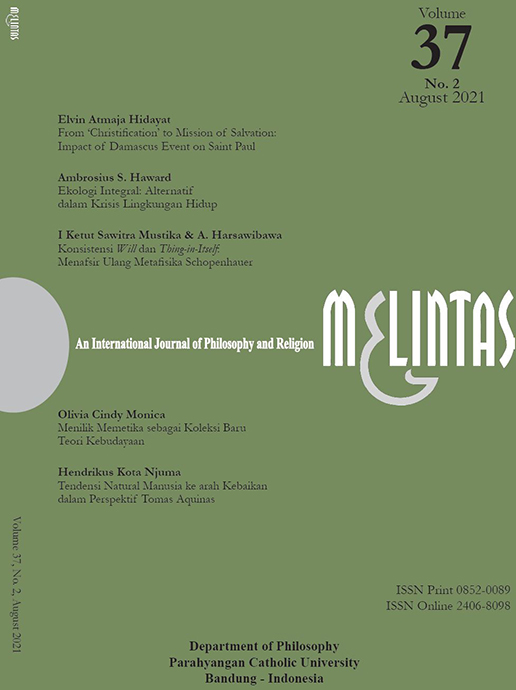Vol. 37 No. 2 (2021)

‘Salvation’ might have been translated into various terms by different fields of study. For some it means the condition of being alive and well, for others it can be related to survival, harmony, the prime of life, completeness, metanoia, faithfulness, et cetera. Whatever we imagine and think about being saved, there are always a lot of interpretations according to the lived world of each individual. In this horizon, the question “Have you been saved?” might just be identical to the question “Are you okay?”. One does not have to have philosophical or theological background to answer this sort of question. It completely depends on how you live your life in this very moment.
However, as long as we live, our mind is constantly changing its perspective in seeing our salvation on this earth. This edition of Melintas pools the interpretations of how we walk the different journeys towards salvation. The first article sees the impact of the so-called “Damascus Event” on Saint Paul, an event that moves him from ‘christification’ to a mission of salvation. Paul’s christification brings direct implications to his courage in becoming a follower of Christ with a burning passion to proclaim the Gospel to all nations. The second article follows Pope Francis’ idea of an integral ecology in Laudato Si’ and Leonardo Boff’s idea of eco-spirituality to propose a different perspective to save the cosmos in crisis. The author explores how human spiritual crisis should be encountered with a worldview that emphasises on the unity of all components that exist in the cosmos as God’s creation. The third article presents a different reading of Arthur Schopenhauer’s metaphysics by finding consistencies between his understanding of will and thing-in-itself. It explains that the true function of the will in his metaphysics lies in the name and concept by which one can think about thing-in-itself objectively. The fourth article sees that the unit of transmission and replication in the cultural evolution can be associated with meme. Its author explores how memes are spread out through human interactions and the various kinds of media, and therefore culture will always be in the state of developing and changing. The fifth article elucidates human being’s tendency towards goodness in the perspective of Thomas Aquinas. This goodness appears externally in the human action, and as an external action it is named actus humanus, which manifests the moral aspect of a human being.
Back again to the question of salvation, we cannot simply express our interpretations about the state of being saved or of being okay. Salvation is a matter of our experience in the lived world. Interpretations always come later. For the sake of discourse and understanding, interpretations can enrich the process of discovering meanings. But our mind in everydayness finds the meaningfulness of life in how we live in each moment. Stay saved.

